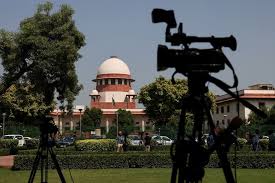The appellant has been convicted for the offence punishable under Section 302 of the Indian Penal Code (Para 2)
The prosecution has relied upon (a) extra judicial confession of the accused allegedly made before PW-2 and PW-3; (b) recovery of axe at the instance of the appellant-accused coupled with evidence of PW-5-Chanchalben who claimed that the same axe was taken away by the appellant from her house; and (c) blood stains were found on the clothes on the person of the appellant. (Para 5)
When prosecution relies upon the evidence of extra judicial confession, normally, the Court will expect that the evidence of the persons before whom extra judicial confession is allegedly made, must be of sterling quality. In this case, it is very difficult to believe that the appellant-accused would make confession before the real brother and a close acquaintance of the deceased. (Para 7)
That is not the only reason for discarding the theory of extra judicial confession. We may note here that according to PW-2 and PW-3, the appellant went after the deceased, while he was carrying a bamboo stick. Their version is that the extra judicial confession was made by the appellant that he assaulted the deceased with the stick. But the case of the prosecution, as made out, is that at the instance of the appellant, an axe was recovered which was the weapon of assault. The stick was not recovered. According to the version of PW-2 and PW-3, the appellant went after the deceased with a stick in his hand and while returning, he was carrying the same stick. (Para 8)
However, we find from the Serology Report on record that the clothes on the person of the deceased were having blood stains of ‘O’ group. Three clothes recovered from the appellant were having blood stains. As regards the trouser of the appellant, the opinion was inconclusive. But as regards the other two items of clothes, it was found that the blood was of ‘A’ group. This militates against the case of the prosecution that the blood stains on the clothes of the appellant were of the blood of the deceased. The recovery of the axe at the instance of the appellant is of no relevance, as according to PW-2 and PW-3, the appellant was carrying a stick. (Para 9)
The appellant is acquitted of the offence alleged against him. (Para 11)
SUPREME COURT OF INDIA
2023 STPL(Web) 424 SC
[2023 INSC 1003]
Prabhatbhai Aatabhai Dabhi Vs. State Of Gujarat
Criminal Appeal No. 1926 of 2011-Decided on 8-11-2023
https://stpllaw.in/wp-content/uploads/2023/11/2023-STPLWeb-424-SC.pdf







